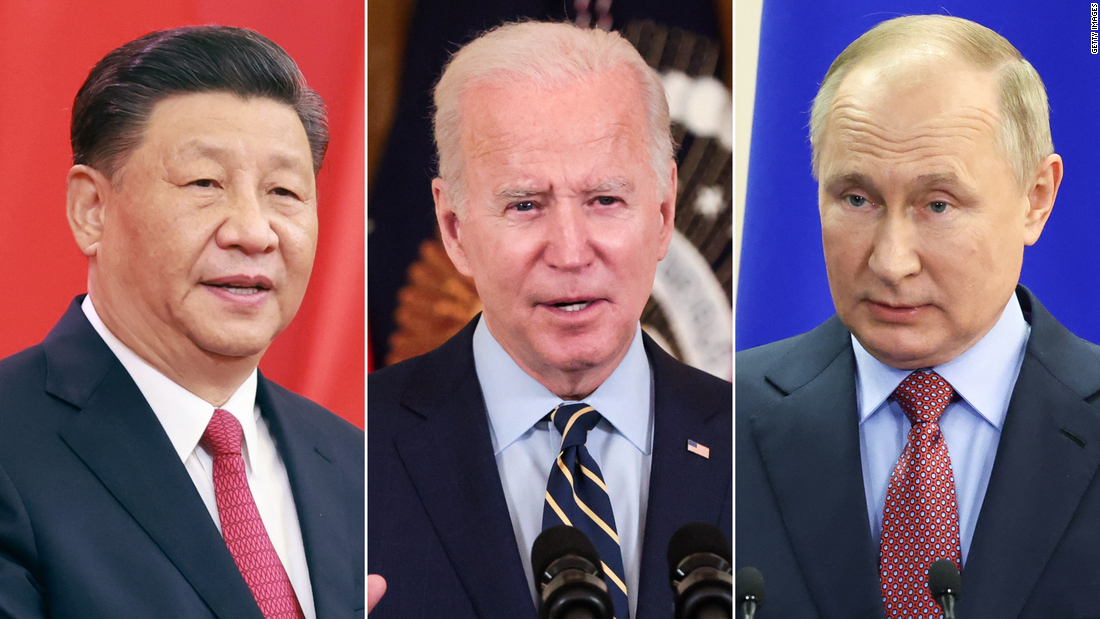State media outlets in the two nations are working to denigrate the Biden administration’s summit and calling the project hypocritical
A flurry of tweets from Chinese diplomats refer to the event as a “so-called” democracy summit, while a Russian political commentator writing in a state-run Chinese newspaper compared the US initiative to “a mistress of a brothel teaching morale [sic] to schoolgirls.”
“[China and Russia] see this as an opportunity to exacerbate cynicism in the political West and undermine any headlines that come out of this summit,” said Jessica Brandt, policy director for the Artificial Intelligence and Emerging Technology Initiative at the Brookings Institution.
It’s a familiar playbook, the type of influence operation that the US will likely have to contend with for years as it competes with the repressive governments to shape global opinions on governance, according to analysts.
“You’re seeing this really concerted effort [from China] to undermine US democracy and put forward an alternate view,” said Kenton Thibaut, a resident China fellow at the Atlantic Council’s Digital Forensic Research Lab.
The “Summit for Democracy” is one of the Biden administration’s most high-profile efforts to promote democratic norms. The conference will feature virtual meetings Thursday and Friday and involve representatives of 100 governments, along with civil society groups and journalists, according to the White House.
“We approach this week with both humility and confidence. Humility in that we want to listen and learn and don’t shy away from our shortcomings; confidence in our constant striving for a more perfect union,” Undersecretary of State for Civilian Security, Democracy, and Human Rights Uzra Zeya said Tuesday.
Chinese and Russian officials are trying to undercut that message.
The ambassadors of China and Russia to the US fumed that the summit was “anti-democratic” in a joint opinion piece published in late November by The National Interest, an American magazine. The Chinese and Russian diplomats falsely referred to their countries as democracies.
Bret Schafer, a senior fellow who tracks disinformation at the Alliance for Securing Democracy, said that “democracy” has been the most popular Twitter hashtag for Chinese diplomatic and other government accounts in the last week.
“It really has been a messaging priority [for China] for weeks,” Schafer told CNN.
When asked how the Biden administration might counter Russian and Chinese narratives around the summit, a senior administration official said, “Today, many autocratic governments advance the falsehood that only by restricting citizens’ actions can societies ensure prosperity and security. Nothing could be further from the truth.”
Despite China’s authoritarian political system and well-documented human rights abuses, the country’s propagandists see the promotion of Chinese notions of governance as a path to legitimacy on the world stage, Thibaut said.
“This is very much in line with what China’s been trying to do the last couple of years, which is redefine certain concepts on the world stage, including human rights and democracy,” she told CNN.
Some experts are hoping the summit will deliver tangible steps to combat the harm disinformation does in democracies by spreading lies about elections or the coronavirus.
Nina Jankowicz, a fellow at the Wilson Center, urged the Biden administration to build support for an alliance to counter the anti-democratic disinformation pushed by China, Russia, and other countries.
“Disinformation from both foreign actors and domestic sources is threatening the bedrock of democracies around the world and playing a major part in many of the world’s crises,” Jankowicz told CNN. “It’s important for the Biden administration to emphasize that truth is a cornerstone of both the Biden era and the democratic community it hopes to build.”
![]()


